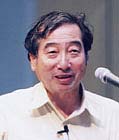 Keynote Proposal 2
Keynote Proposal 2
"Conditions of an Active Aging Society"

- Keiji Ohga
-
- Professor, College of Bioresource Sciences, Nihon University
In light of the increasing population in developing countries and growing demands for foodstuffs, as Japan's dependence on overseas sources for food increases, many people in Japan are growing concerned about the constraints placed on global resources and the earth environment. As many Asian countries realize rapid economic growth, a transformation is taking place in the structure of the food supply and demand matrix with a shift from a diet centered on grains to one that encompasses vegetables, fruits and livestock. As such, there are many issues to be faced in the diversification of agriculture as it advances to higher stages of production. Who will produce the vast amount of livestock feed that will be necessary to support the increase in the consumption of livestock in increasingly affluent Asian countries? Will rice be used as livestock feed? Will rice fields be converted to the production of livestock feed? Or will these countries wind up depending on imports? The various issues that have been faced by the Japanese agricultural sector are now confronting the entire agricultural sector in Asia at an even higher order of magnitude. Moreover, as the nations of Asia reach an ever deepening level of mutual dependence on foodstuffs and agricultural products there is an ongoing abandonment of farmland in agricultural areas in regions with unfavorable conditions. This is creating serious new problems in terms of ensuring the maintenance of the basic foundation for the livelihood of the people of the local regions as well as regarding the need to identify new modalities for ensuring food safety.






